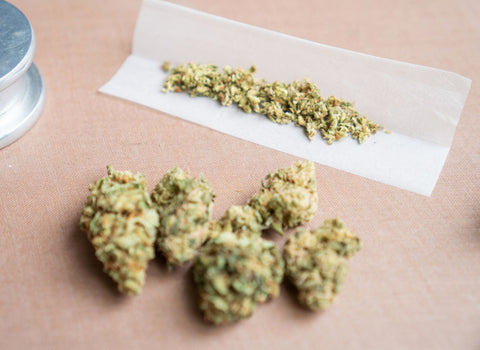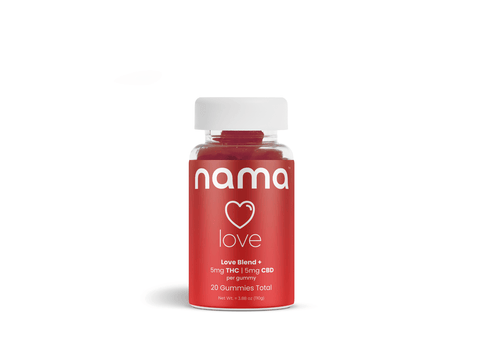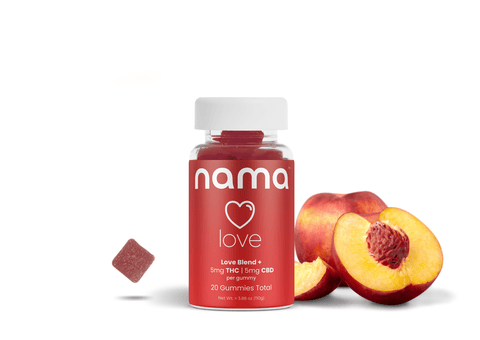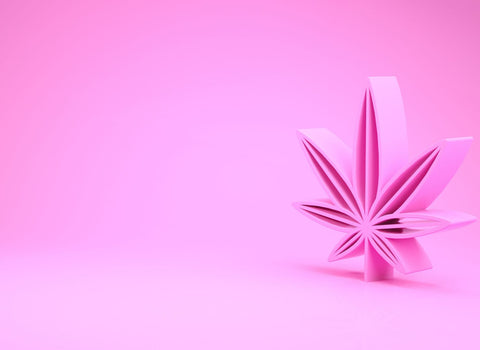
Does cannabis help or exacerbate bipolar disorder (BPD)? It seems it could go either way, depending on dosage.
High-dose cannabis seems to exacerbate BPD:
- A 2019 study in Neuroscience & Biobehavioral Reviews reveals that 24% of BD patients use cannabis.
- British researchers warn that cannabis use is associated with increases in depressive and manic symptoms in people with BD.
There’s reason to hope that low-dose cannabis may help BPD symptoms:
- Low-dose cannabis is known to have mental health benefits. For example, it seems to improve anxiety and depression symptoms.
- We know that cannabis microdoses interact with the body differently than high-dose cannabis.
Our cannabis edibles contain ultra-low doses of THC, so their effects are more mellow and chill. You can get all the THC provides the therapeutic benefits of microdosing without the adverse effects that can occur with higher doses.


THC: 10 mg | CBC: 10 mg | CBD: 10 mg | CBG: 5 mg | CBN 5mg
What is bipolar disorder?
Bipolar disorder is a mental health condition characterized by extreme shifts in mood and energy levels. People with bipolar disorder alternate between depressive episodes where they feel very sad, and manic episodes where they feel extremely energized and impulsive (that’s why BD was previously called manic-depressive illness).
The cycles between highs and lows can be rapid or gradual, occurring over days, weeks, or months.
What are the symptoms of bipolar disorder?
Bipolar disorder causes dramatic shifts in mood, energy, activity levels, and the ability to function normally. People with bipolar disorder experience distinct periods of mania or hypomania, depression, and sometimes mixed symptoms or normal moods.
Manic episodes may include the following symptoms:
- Extreme euphoria or irritability
- Risky or impulsive behaviors (e.g., going on spending sprees, engaging in unsafe sex, or making reckless investments)
- An abnormally upbeat, charged mood
- Decreased need for sleep but feelings energetically charged
- Racing thoughts or talking very rapidly
- An inflated sense of self-confidence
- Delusions or hallucinations in severe cases
Depressive episodes may involve these symptoms:
- Loss of energy, moving or thinking slow
- Feelings of profound sadness, emptiness, worthlessness, or hopelessness
- Loss of interest in activities previously enjoyed
- Sleep irregularities (sleeping too little or too much)
- Difficulty concentrating or making decisions
- Irritability
- Suicidal thinking
Bipolar disorder symptoms can vary dramatically between different people. Some symptoms may depend on the type of bipolar disorder.
What are the types of bipolar disorder?
There are three main types of bipolar disorder:
- Bipolar I involves intense emotional episodes that swing between high, energetic manic states and low, depressive states over periods of days, weeks, or months. Manic states are marked by elevated self-esteem, rapid speech, impulsivity, heightened risk-taking, and in severe cases, delusions. Depressive crashes involve profound, immobilizing sadness, suicidal thinking, and other symptoms.
- Bipolar II also involves shifts between high and low states, but the “highs” are less severe than hypomanic episodes. People with bipolar II often spend more time in depressed states.
- Cyclothymia is a disorder that involves fluctuating mood states and symptoms of hypomania and depression that don’t reach the threshold for full manic or major depressive episodes.
During periods of remission or stability between cycles, people with bipolar disorder often return to a calm mood and balanced thinking, known as a euthymic state.
What causes bipolar disorder?
Bipolar disorder involves multiple contributing factors, rather than a single cause. While genetics plays a clear role, no single gene defect causes bipolar disorder. It likely arises from the combined influence of genetic abnormalities, along with other biological and environmental influences that impact brain function and mood regulation.
Possible causes and risk factors for developing BD include:
- Family history of bipolar disorder or related mental health disorders
- Imbalances in neurotransmitters
- Hormonal imbalances
- Abnormal thyroid function
- Circadian rhythm disturbances
- High stress levels may act as a trigger
- Drug or alcohol use
- Major life events: trauma, grief, job loss, relationship turmoil or other upheavals
- Head injury or conditions causing brain tissue damage
- Early childhood adversity, trauma, or verbal abuse
How is bipolar disorder treated?
While there is no “cure” for bipolar disorder, combining medication, therapy, education, healthy habits, and social support is critical for managing symptoms.
Here are the most effective treatment options for managing BD:
- Mood stabilizing medications are usually prescribed to control manic and depressive episodes. Common options include lithium, anticonvulsant medications, atypical antipsychotics, and in some cases antidepressants.
- Different types of psychotherapy help patients better cope with symptoms, manage stress, regulate their moods, monitor warning signs, and develop healthy routines and habits. Cognitive behavioral therapy (CBT) and interpersonal therapy seem to be the most efficient.
- Peer support groups and ongoing check-ins with mental health providers equip patients and families with education and coping tools for the disorder.
- Healthy lifestyle habits support pharmacological and psychosocial treatments. These include maintaining good sleep patterns, exercising regularly, eating a balanced diet, and minimizing substance use.
Recently, people with bipolar disorder have begun experimenting with controlled microdoses of cannabis to stabilize mood, reduce anxiety, improve sleep quality, and relieve chronic pain.
As we mentioned before, research on the effects of microdosing cannabis on BD is still in the early stages. While more studies are needed to evaluate the therapeutic potential of cannabis edibles, we’ll discuss what we know about the beneficial effects of cannabis for mental health and how it may help people with bipolar disorder.
Does cannabis help treat bipolar disorder?
An article from Medical News Today suggests that, while there is plenty of anecdotal evidence to support the use of cannabis for treating bipolar disorder, scientific evidence remains unclear. Some studies reveal that cannabis may worsen symptoms of BD.
Researchers at the University of Washington presented mixed findings on cannabis use for bipolar disorder. On one hand, they suggest cannabis may temporarily improve some mood symptoms such as anger, tension, and depression in people with BD. On the other hand, they revealed that “marijuana use or use disorder is associated with worsened affective episodes, psychotic symptoms, rapid cycling, suicide attempts, decreased long-term remission, poorer global functioning, and increased disability.”
Dosage seems to be the crux of the issue here. Most studies exploring this connection have involved participants smoking or ingesting relatively high amounts of cannabis through methods like joints, pipes, or bongs. With these consumption methods, they cannot effectively control the levels of Delta 9 THC and cannabidiol (CBD), so we don't know whether carefully calibrated, low doses could have therapeutic effects on bipolar disorder.
We do know that small amounts of THC and CBD may alleviate symptoms of anxiety. We also know that many people microdose cannabis for depression. Due to these mood-stabilizing properties, microdoses of THC and CBD may be beneficial for people with BD as well.
To soothe the mind and banish anxious thoughts, we recommend our low-dose Energy gummies. With only 2.5 mg of THC and 5 mg of CBD, these fruity edibles achieve the perfect fast-acting, longer-lasting anti-anxiety effect.
"I thought I was going to like Bliss the best, but Energy hit the spot. It gives me all the feels without any “high” feeling. That's what I was looking for!"
Can cannabis cause bipolar disorder?
Several studies do show associations between cannabis abuse, especially in teens, and increased risk of depression and bipolar episodes later on. That doesn’t prove cannabis (especially low-dose edibles) causes these mental health issues. People with emotional struggles may simply be more likely to heavily use cannabis to cope.
Danish researchers looked at the genetic relationship between bipolar disorder and cannabis use. They found that genetic factors that make people more likely to develop bipolar disorder also make them more likely to use cannabis at some point in their lives. However, the opposite is not true—genetics related to using cannabis do not make individuals more likely to develop BD.
A 2022 study looked at whether having bipolar disorder or cannabis use disorder runs in the family. They found that:
- If someone has cannabis use disorder, their family members are more likely to have it too.
- People with bipolar II disorder tend to have more relatives with cannabis use disorder as well.
- Family members who personally have bipolar II disorder, in addition to having bipolar disorder in their family, are at the highest risk for problematic cannabis use.
Based on these findings, researchers concluded that bipolar disorder risk increases the chances of using cannabis, while cannabis use does not cause bipolar disorder.
The research can seem conflicting, and more high-quality long-term studies will provide more clarity. Moderation is always the way to go, and for some, microdosing cannabis helps stabilize mood and relieve stress without causing impairment.
If you need something to take the edge off and help with depressive symptoms, try our Relax Plus gummies. They combine the chilling CBD and tension-releasing THC in balanced amounts; a mighty combo that acts fast to enhance relaxation.
What is cannabis-induced mania?
Cannabis-induced mania refers to symptoms of mania that are triggered by heavy cannabis use. When heavy cannabis consumption precedes and directly causes otherwise unexplained manic symptoms, that is called cannabis-induced mania.
It often involves:
- Elevated or irritable mood
- Increased activity levels
- More impulsive behavior
- Disrupted sleep habits
These bouts tend to be temporary and resolve with abstinence, unlike the repeating mood episodes seen in those with bipolar I or II disorder.
Research has shown that cannabis use may trigger manic symptoms in people with pre-existing bipolar disorder. It might also contribute to the development of manic-type symptoms in those without a pre-existing diagnosis.
One thing is for sure: if you stick to small amounts, you can reap cannabis's therapeutic benefits while avoiding the risks of cannabis-induced mania or worsening bipolar disorder. Microdosing can provide valuable insight into whether cannabis helps or harms your mental health.
That’s why we love our edibles and THC-infused drinks. With only 2.2 mg of THC per full dropper, our unflavored Buzz drops are the perfect addition to your favorite non-alcoholic drinks.
Explore our collection of mouth-watering THC mocktails and enjoy the rich flavors and mellow vibes.
Product QUIZ
Need help deciding what product is best for you? Take our quiz, just three questions until your perfect match!
Is cannabis good for mental health?
We’ll risk sounding like a broken record, but the key to using cannabis to treat any mental or physical condition is the dosage. While heavy, recreational cannabis use often negatively impacts mental health, carefully calibrated microdoses are the real deal. Tiny amounts of THC, CBD, and other cannabis compounds seem to effectively stabilize and support the mind without the negative effects sometimes seen with higher doses.
Cannabis microdoses may:
- Lightly lift mood and induce calm by modulating the endocannabinoid system, reducing feelings of panic, rumination, and dread.
- Diminish traumatic memories and PTSD by properly regulating brain areas related to memory and fear response.
- Gently lift mood by increasing serotonin without heavily impairing cognition or motivation like high doses can.
- Promote sleep by balancing circulation, lowering anxiety, and regulating circadian rhythms and melatonin release.
- Improve focus by altering glutamate and dopamine signaling just enough to improve attention span without causing distraction. This means microdosing cannabis may improve the symptoms of ADHD.
The key is to find your minimum effective dose. Start low, and track biometric feedback and mood over weeks. Increase slowly only if needed and until subtle benefits emerge.
Can you get a medical card for BD?
Bipolar disorder alone is not a qualifying condition for a medical cannabis card in most US states. Susan A. Stoner, Ph.D., reveals that “BD is not listed as a qualifying condition for medical marijuana in any state.”
With that being said, if you have another condition that is eligible for a medical card in your state—chronic pain, insomnia, PTSD, or something else alongside your BD—by all means pursue a card. Be sure your healthcare provider tests how cannabis affects your mood and don't rush to high doses. Stick to microdosing and our delicious low-dose edibles.
Consult your local regulations and healthcare providers for accurate information on the availability of medical cards for BD in your state. Although Delta 9 THC is legal at the federal level, some states still consider Delta 9 illegal within their borders. Be sure to verify your state's specific laws regarding Delta 9 products.
Where to buy the best cannabis edibles
Are you looking for the best THC edibles out there? You’ve got to be smart about where you purchase your edibles. Skip the corner stores or shady brands and products that provide no third-party lab tests and no guarantee that their products are safe and effective.
You want the real deal: safe, third-party tested, quality Delta 9 edibles from reputable brands. Shop from nama and get the best edibles to experience another level of relaxation and get your creative juices flowing. All of our products are organic, lab-tested for purity and potency, and expertly dosed edibles from premium American hemp await you.
Since our edibles contain cannabis compounds derived from hemp, not marijuana, all of our THC edibles are federally legal in the US. Read more about the legality of Delta 9 THC.
Edibles for bipolar disorder FAQ
It is possible to live with bipolar disorder without medication, but the progressive nature of the disorder is better handled with meds. While some preliminary evidence shows alternative treatments could help some individuals cope, for most people, living with untreated bipolar disorder leads to poor functional outcomes. Without mood stabilizing medications, bipolar symptoms often worsen over time, increasing the risk of hospitalization, substance abuse, cognitive impairment, unemployment, psychotic features, and self-harm.l.
Though subjective, the substantial functional impairment that comes with untreated schizophrenia spectrum disorders makes them arguably the most debilitating. In addition to psychotic symptoms like hallucinations or delusions, mood, motivational, cognitive, and other negative deficits are extremely detrimental to quality of life. Even with treatment, real-world outcomes for schizophrenia patients remain poorer on average.
Attempting to self-manage this complex genetic mood disorder without clinical guidance can severely backfire. Inconsistent routines, inaccurate self-assessments, inappropriate medication decisions, and lack of feedback mean self-treatment often worsen the disorder’s development. Qualified psychiatrists create tailored combination treatment plans involving pharmacological and psychosocial aspects that target each individual’s specific set of needs.
Consistent tobacco smoking is associated with worse outcomes in bipolar disorder. According to systematic reviews and meta-analyses, nicotine dependence correlates to more severe manic and depressive symptoms, higher suicide attempt rates, decreased efficacy of psychiatric medications, and increased risk of comorbid substance abuse issues in bipolar patients over time.
Those diagnosed with bipolar disorder are advised to avoid behaviors that exacerbate mood instability, impulsivity, risky behavior, and self-harm. This includes illicit drug use, excessive stimulation, sleep disruption, inconsistent routines, unrealistic goals, and letting stress accumulate. Psychosocial treatment, mood stabilizers, and healthy lifestyle adjustments help manage genetic predisposition to recurring episodes.
While most pharmacological bipolar treatments have limited efficacy, some preliminary research indicates that highly controlled, small CBD doses could potentially help alleviate bipolar symptoms such as depression, mania, mixed episodes, anger, and anxiety. Additional clinical trials and larger studies are needed before recommending CBD supplementation, due to bipolar's complexity and CBD's complicated, subtle effects on brain function.
An accumulating body of research indicates chronic cannabis use—especially frequent, high-potency cannabis—can negatively affect cognitive functioning over time. Areas like memory, motivation, processing speed, attention, decision-making, impulse inhibition, and problem-solving show measurable decline. Neural connectivity and blood flow are altered in associated brain regions. Executive dysfunction leads to real-world issues for things like sustaining employment, creating and maintaining relationships, and independent living.
These neuropsychological downsides worsen with sustained use, higher THC potency, and initiation at a young age. Some impairment can persist through periods of abstinence. On the other hand, microdosing cannabis reveals the powerful potential of small amounts of THC and CBD, and how they can improve your cognitive function, trigger neurogenesis, and even help dementia patients.
Top Sellers
New? Start with our Ultimate Sampler!

THC: 10 mg | CBC: 10 mg | CBD: 10 mg | CBG: 5 mg | CBN 5mg
Resources
Tyler, E., Jones, S., Black, N., Carter, A., & Barrowclough, C. (2015). The Relationship between Bipolar Disorder and Cannabis Use in Daily Life: An Experience Sampling Study. PLoS ONE, 10(3). https://doi.org/10.1371/journal.pone.0118916
Barrell, A. (2021, March 22). What to know about cannabis and bipolar disorder. https://www.medicalnewstoday.com/articles/marijuana-and-bipolar-disorder
Stoner SA. Effects of Marijuana on Mental Health: Bipolar Disorder. Alcohol & Drug Abuse Institute,
University of Washington, June 2017. URL: http://adai.uw.edu/pubs/pdf/2017mjbipolar.pdf
Jefsen, O. H., Speed, M., Speed, D., & Østergaard, S. D. (2020, June 12). Bipolar disorder and cannabis use: a bidirectional two-sample Mendelian randomization study. medRxiv (Cold Spring Harbor Laboratory). https://doi.org/10.1101/2020.06.11.20128470
Quick, C. R., Conway, K. P., Swendsen, J., Stapp, E. K., Cui, L., & Merikangas, K. R. (2022, July 1). Comorbidity and Coaggregation of Major Depressive Disorder and Bipolar Disorder and Cannabis Use Disorder in a Controlled Family Study. JAMA Netw. https://doi.org/10.1001/jamapsychiatry.2022.1338
Marwaha, S., Winsper, C., Bebbington, P., & Smith, D. (2018). Cannabis Use and Hypomania in Young People: A Prospective Analysis. Schizophrenia Bulletin, 44(6), 1267-1274. https://doi.org/10.1093/schbul/sbx158
Thomson, D., Berk, M., Dodd, S., Rapado-Castro, M., Quirk, S. E., Ellegaard, P. K., Berk, L., & Dean, O. M. (2015). Tobacco Use in Bipolar Disorder. Clinical Psychopharmacology and Neuroscience, 13(1), 1-11. https://doi.org/10.9758/cpn.2015.13.1.1
Shrivastava, A., Johnston, M., & Tsuang, M. (2011). Cannabis use and cognitive dysfunction. Indian Journal of Psychiatry, 53(3), 187-191. https://doi.org/10.4103/0019-5545.86796
nama CBD FDA & legal disclaimer
Our products are not intended to diagnose, treat, cure, or prevent any disease. They are not a replacement for prescription medications and have not been evaluated by the Food and Drug Administration (FDA).
The information provided on this website does not and is not intended to, constitute legal advice or any statements of the status of any laws. Any information, content, and materials available on this site are for general informational purposes only and are not intended to be relied upon for any purpose.
Readers of this website should contact their attorney to obtain advice concerning any particular legal matter including decisions on what products are, or are not, legal to sell, possess, or consume. No reader, user, or browser of this site should act or refrain from acting on the basis of information on this site without first seeking legal advice from their own counsel in the relevant jurisdiction.
Only your individual attorney can provide assurances that the information contained herein – and your interpretation of it – is applicable or accurate for your particular situation. Use of, and access to, this website or any of the links or resources contained within the site do not create an attorney-client relationship between the reader, user, or browser, and website authors, contributors, contributing law firms, or committee members and their respective employers.
About
Learn
Join us on this journey

© Copyright 2026 nama Products LLC. All Rights Reserved.
†These statements have not been evaluated by the Food and Drug Administration. These products are not intended to diagnose, treat, cure or prevent any disease. All information presented here is not meant as a substitute for or alternative to information from health care practitioners. Please consult your health care professional about potential interactions or other possible complications before using any product.
††The information provided on this website does not, and is not intended to, constitute legal advice or any statements of the status of any laws. Any information, content, and materials available on this site are for general entertainment purposes only, and are not intended to be relied upon for any purpose.

By clicking ‘Yes,’ you agree to our
Terms & Conditions and Privacy Policy
123 John Doe Street
Your Town, YT 12345
Store Hours
Sun: Closed
Mon-Fri: 9:00 - 17:00
Sat: 10:00 - 13:00
What to expect at pickup
Closed
Closing at 5pm
Closing at 5pm
Closing at 5pm
Closing at 5pm
Closing at 5pm
Closing at 1pm



![Euphoria Kiwi Raspberry [10ct]](http://www.namacbd.com/cdn/shop/files/nama_kiwi_raspberry_pouch.png?v=1715285056&width=480)
![Euphoria Kiwi Raspberry [10ct]](http://www.namacbd.com/cdn/shop/files/nama_euphoria_kiwiraspberry_nutrition_facts.jpg?v=1715873960&width=480)
![Euphoria Triple Berry [10ct]](http://www.namacbd.com/cdn/shop/files/nama_euphoria_triple_berry_pouch.png?v=1715286095&width=480)
![Euphoria Triple Berry [10ct]](http://www.namacbd.com/cdn/shop/files/nama_euphoria_tripleberry_nutrition_facts.jpg?v=1715873950&width=480)


![Buzz Drops™ [THC Drink Drops]](http://www.namacbd.com/cdn/shop/files/nama_thc_buzz_drops.png?v=1711412866&width=480)
![Buzz Drops™ [THC Drink Drops]](http://www.namacbd.com/cdn/shop/files/buzz-drop-wine-comparison.png?v=1736882023&width=480)
![Buzz Packs™ [THC and CBD Powder Drink Mix]](http://www.namacbd.com/cdn/shop/files/nama_buzz_packs_thc_drink_pack_white_background.png?v=1741884660&width=480)
![Buzz Packs™ [THC and CBD Powder Drink Mix]](http://www.namacbd.com/cdn/shop/files/Buzz_Packs_Label.png?v=1741884660&width=480)
















Comments (0)
There are no comments for this article. Be the first one to leave a message!